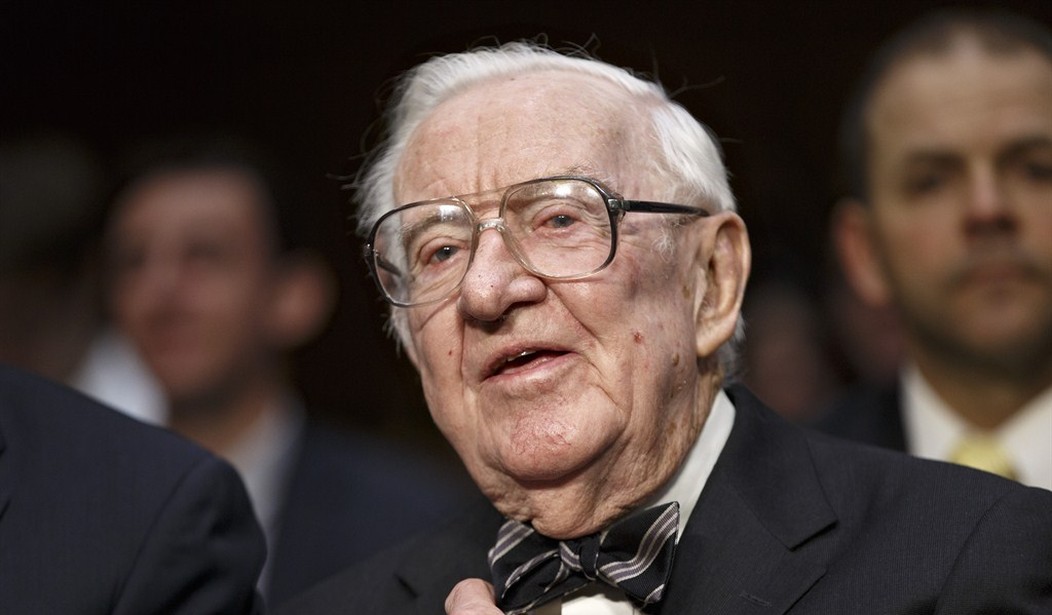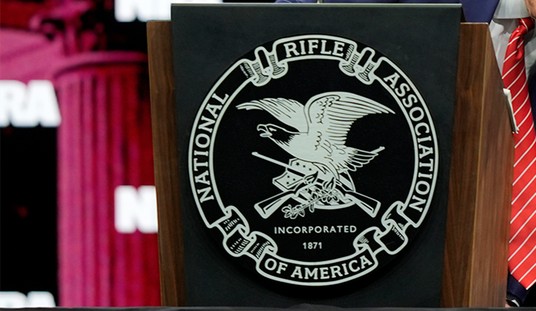AP Photo
The Heller decision is one of the most important decisions the Supreme Court has reached in the last century, if not of all time. While it didn’t go as far as I’d have liked for it to go, it established that the right to keep and bear arms was an individual right, a fact that still rankles gun control activists to this very day.
However, it wasn’t unanimous. Few decisions are, these days, but usually, those who come out on the losing side of a 5-4 decision let their written dissent be their final word on the issue.
For former Supreme Court Justice John Paul Stevens, though, he can’t let it lie.
Stevens was one of the dissenting justices on the Heller decision, and he’s been bitter about it ever since. He’s even gone so far as to suggest we should repeal the Second Amendment.
Now, he’s taking to the virtual pages of The Atlantic to describe how he was right, and five other Supreme Court justices were wrong.
District of Columbia v. Heller, which recognized an individual right to possess a firearm under the Constitution, is unquestionably the most clearly incorrect decision that the Supreme Court announced during my tenure on the bench.
The text of the Second Amendment unambiguously explains its purpose: “A well regulated militia, being necessary to the security of a free State, the right of the people to keep and bear Arms, shall not be infringed.” When it was adopted, the country was concerned that the power of Congress to disarm the state militias and create a national standing army posed an intolerable threat to the sovereignty of the several states.
Which, of course, is bull.
Our Founding Fathers’ writings are clear. They viewed the right to keep and bear arms as an individual right. That makes sense, especially when you consider that militia members provided their own arms for call outs.
Stevens pens a whole lot of words in his piece, but almost all of them boil down to one simple thing: Sour grapes.
He lost the vote, and he’s still upset about it.
Now, I get that. I understand that Stevens feels that he’s right about the issue–otherwise, why hold that position? However, he keeps pretending that there’s no possible way he was wrong, no way at all. The only possible failure he admits to is not doing more to change the minds of fellow justices.
It also represents my greatest disappointment as a member of the Court. After the oral argument and despite the narrow vote at our conference about the case, I continued to think it possible to persuade either Justice Anthony Kennedy or Justice Clarence Thomas to change his vote. During the drafting process, I had frequent conversations with Kennedy, as well as occasional discussions with Thomas, about historical issues, because I thought each of them had an open mind about the case. In those discussions—particularly those with Kennedy—I now realize that I failed to emphasize sufficiently the human aspects of the issue as providing unanswerable support for the stare decisis argument for affirmance. After all, Kennedy had been one of the three decisive votes that had saved Roe v. Wade from being overruled in Planned Parenthood v. Casey.
The truth is that he lost and he’s mad. More importantly, he wants everyone to know he’s mad.
What he’s trying to do here is somewhat insidious if you think about it.
Gun rights supporters have the Heller decision to bolster our arguments that the Second Amendment is an individual right. After all, the Supreme Court is the highest court in the land. Its word is, basically, law.
Yet Stevens continues to beat this drum because he’s the only one with enough legal standing to remotely refute the findings in Heller. He was on the Court at the time, after all. For all his flaws, Stevens isn’t stupid. He knows damn good and well he can’t change the past. Stevens can talk all he wants about how he might have been able to change the vote then, but even if that were possible–something I’m unconvinced of–he knows that time is gone.
So what he’s doing is trying to lay the groundwork for activists to try and fight back from a legal position. He’s giving them links to use in arguments to counter gun rights advocates citing Heller.
He knows he won’t change anything, but he’s trying to give his side ammunition.
However, through all of his screed, he fails to address one point.
Stevens maintains that the Second Amendment exists to protect states from federal encroachment on their ability to maintain militias. He argues that it was never about the individual.
The text would suggest otherwise. The Second Amendment [emphasis added]:
A well-regulated militia being necessary to the security of a free state, the people’s right to keep and bear arms shall not be infringed.
The people’s right to keep and bear arms.
Now, keep in mind that Stevens maintains that the people in question are states. If so, how does he explain the wording of the Tenth Amendment?
The powers not delegated to the United States by the Constitution, nor prohibited by it to the States, are reserved to the States respectively, or to the people.
Here, we see that the states and the people are listed as two separate entities. If “the people” means “the states,” then why would they phrase another amendment from the same era in such a way? They wouldn’t.
The people are referenced also in the First Amendment.
Congress shall make no law respecting an establishment of religion, or prohibiting the free exercise thereof; or abridging the freedom of speech, or of the press; or the right of the people peaceably to assemble, and to petition the Government for a redress of grievances.
Does this refer to states? So far as I’m aware, no court has ever argued it did.
How about the Fourth Amendment?
The right of the people to be secure in their persons, houses, papers, and effects, against unreasonable searches and seizures, shall not be violated, and no Warrants shall issue, but upon probable cause, supported by Oath or affirmation, and particularly describing the place to be searched, and the persons or things to be seized.
Again, does this apply to an individual or the state? It’s always been interpreted as being an individual right, hasn’t it?
Then we have the Ninth Amendment.
The enumeration in the Constitution, of certain rights, shall not be construed to deny or disparage others retained by the people.
Another Amendment, another case of where the Bill of Rights writers are talking about the people and not the state. These were all passed at the same time, meaning there isn’t a real chance of definitions having changed between their passage.
In every other case, the term “the people” refers to an individual’s rights. Every one.
Yet Stevens would argue that somehow, miraculously, the Founding Fathers had another definition in mind on just one amendment. He has yet to answer this argument in any way so far as I’ve seen. Instead, he keeps preaching anti-Second Amendment nonsense while pretending that he was right all along.
He wasn’t when Heller was decided, and he’s not now.








Join the conversation as a VIP Member